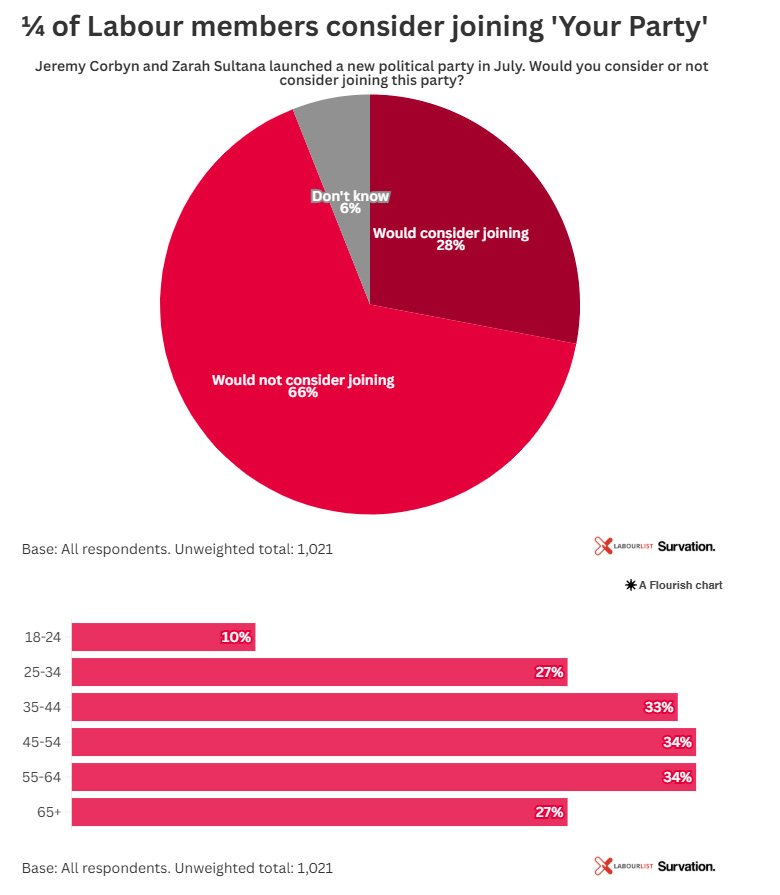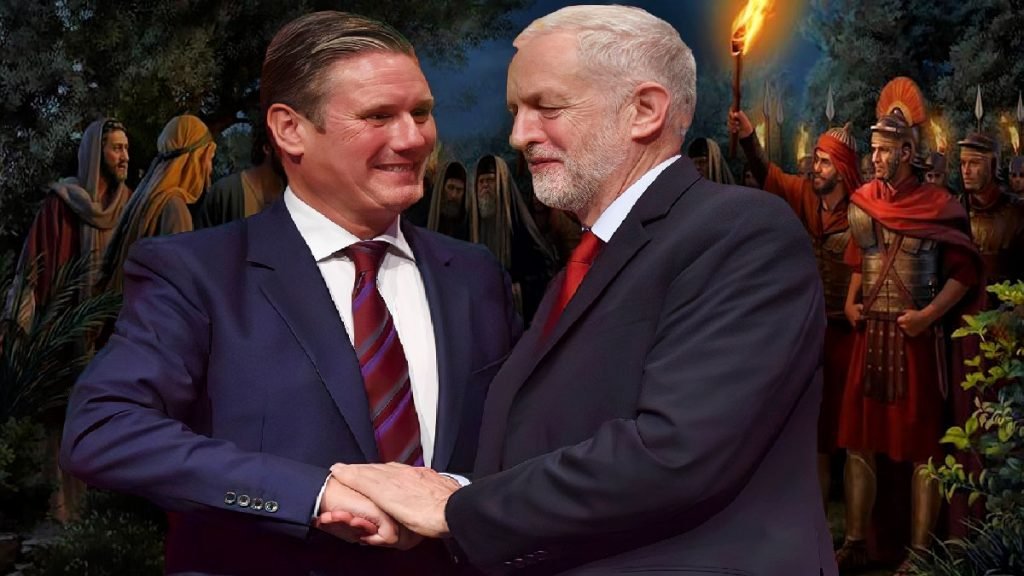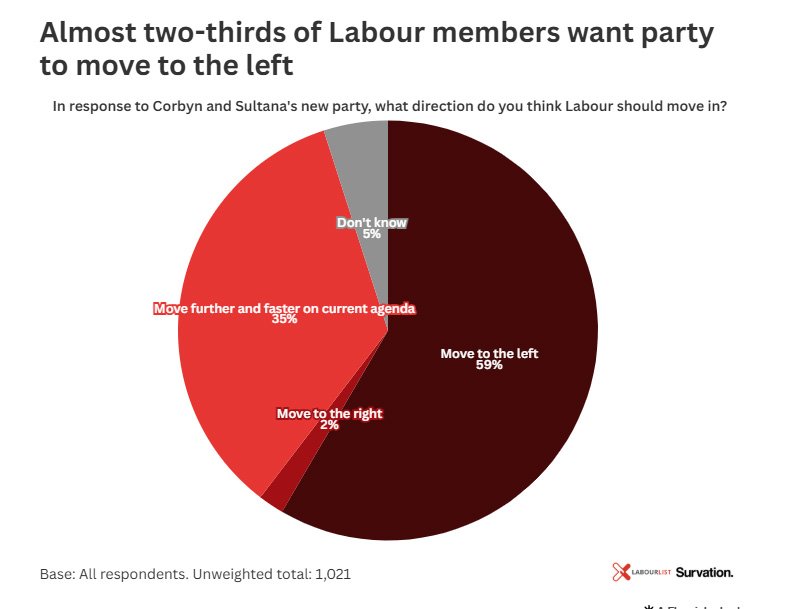Poll: 28% of Labour Members Would Consider Joining Corbyn’s New Party
When over a quarter of your own party members would consider abandoning you for the leader you spent years systematically destroying, you’ve achieved something remarkable: creating your own gravediggers from the very people who put you in power. The exclusive Survation poll for LabourList reveals the devastating reality facing Keir Starmer, 28% of Labour members would consider joining Jeremy Corbyn and Zarah Sultana’s new party, a figure that should terrify every Blairite apparatchik who thought they’d buried democratic socialism forever.
This isn’t merely dissatisfaction; it’s a rebellion brewing within Labour’s own ranks. When nearly three in ten of your activists, the people who deliver leaflets, knock doors, and fundraise for campaigns, contemplate defection to the very man you’ve spent years demonising, you’ve fundamentally misunderstood the movement you claim to lead.
The Demographics of Betrayal

The polling data reveals exactly who Starmer has alienated most completely. Men are more likely to consider jumping ship (31%), along with those aged 45-54 (34%), the demographic backbone of political activism who possess both experience and energy to build alternative movements. Most damning, 44% of members who joined around 2015 would consider leaving, representing the Corbyn surge that transformed Labour into a genuine mass movement before the right-wing saboteurs got their hands on it.
The regional variations tell their own story. Members in the East of England show highest defection rates (41%) while London, Starmer’s metropolitan comfort zone, shows the lowest (17%). This suggests that outside the capital’s bubble, where working-class communities face the reality of continued austerity under Labour governance, the appetite for authentic alternatives runs strongest.
Perhaps most revealing: 70% of Rebecca Long-Bailey supporters from the 2020 leadership election would consider joining Corbyn’s party. These aren’t fringe activists or unrealistic idealists, they represent the continuity wing of democratic socialism who understood exactly what Starmer’s victory would mean for the movement.
Manufacturing the Opposition

Starmer has created this crisis through systematic betrayal of every principle that brought him to power. He won Labour leadership by promising unity, then purged the left. He pledged to maintain popular policies, then abandoned them for corporate-friendly alternatives. He claimed to represent change, then delivered more sophisticated management of decline.
The 28% considering defection represents the human cost of political triangulation. These are people who believed Starmer’s promises about “radical Labour government” and “social justice,” only to discover they’d elected a more polished version of Tony Blair without the electoral success. When your own supporters contemplate leaving for your predecessor, you’ve achieved the impossible: making retreat look like advance.
Damian Lyons Lowe’s observation that “consideration” represents a “softer measure than outright support” misses the political significance. In party politics, consideration of alternatives indicates fundamental dissatisfaction that organisational inertia temporarily contains. When members start looking elsewhere, the foundation of political loyalty has already cracked.
The Ticking Time Bomb

When a political party’s primary selling point becomes preventing something worse rather than delivering something better, it has already conceded the argument. ‘Your Party’ will inevitably scoop up the masses searching for real change, real hope, and genuine opportunity, everything Starmer’s Labour promised but systematically abandoned. The choice facing voters becomes stark: accept managed decline with a red rosette, or demand the transformation that was pledged but never delivered.
The FPTP electoral system that once protected Labour from left-wing challenges now faces unprecedented strain. When significant portions of Labour’s activist base contemplate defection, when membership surges toward alternatives, when grassroots energy shifts to new formations, the two-party system’s stability faces existential threat.
The Return of Democratic Socialism

Corbyn’s emergence from political exile with a spring in his step represents more than personal vindication, it signals democratic socialism’s refusal to accept permanent defeat. The man they said was finished, whose ideas they claimed were discredited, whose supporters they dismissed as cultists, returns stronger precisely because the alternative has proven so spectacularly inadequate.
The country that elected Labour in 2024 was indeed “sick to the back teeth of neoliberalism and the Tories,” expecting transformative change from a party that promised exactly that during fourteen years of opposition. Instead, they received austerity with a human face, corporate welfare with progressive rhetoric, and managed decline with better public relations.
Starmer’s tragedy lies in inheriting a genuinely transformative moment and squandering it on technocratic incrementalism that satisfies neither business interests seeking predictability nor working-class communities demanding justice. He achieved the worst of both worlds: disappointing supporters while failing to reassure opponents.
The Path Ahead

The autumn conference that will formalise Corbyn and Sultana’s party represents a crucial test of British democracy’s capacity for renewal. If they can transform membership enthusiasm into organisational infrastructure, if they can develop policies that speak to contemporary crises while maintaining socialist principles, if they can avoid the sectarian infighting that has historically plagued left alternatives, they could reshape British politics permanently.
The 28% of Labour members considering defection represent seed capital for this transformation. These are people with political experience, local knowledge, campaign skills, and community connections that no amount of corporate funding can replace. When they walk away from Labour, they take institutional memory and grassroots capacity that took decades to build.

For Starmer, the poll represents a wake-up call he’s unlikely to heed. His response will probably involve more lectures about electability, more triangulation toward imaginary centre-ground voters, more attempts to “move further and faster” on the same failed agenda that created this crisis. The man who claimed pragmatism over principle will discover that unprincipled pragmatism produces neither electoral success nor party loyalty.
The reckoning has begun. The same forces that built Corbyn’s movement, and that Starmer spent years trying to suppress, are stirring again, hungrier and wiser for the experience of betrayal. The question isn’t whether Labour can survive this challenge, but whether it deserves to.
When your own members start looking elsewhere, you’ve stopped leading and started managing decline. When the alternative comes from the man you tried to destroy, you’ve created not just opposition but nemesis. Starmer’s Labour may have won power, but it’s losing the argument, and in politics, that’s what ultimately matters.
The revolution Starmer tried to prevent by capturing Labour is happening anyway, outside Labour’s structures and beyond his control. The 28% considering departure today may become 50% tomorrow, taking with them not just membership fees but the last of Labour’s left. Some betrayals prove too comprehensive to survive, and boy is the Labour Party well versed in betrayals…
Support Independent Journalism Today
Our unwavering dedication is to provide you with unbiased news, diverse perspectives, and insightful opinions. We're on a mission to ensure that those in positions of power are held accountable for their actions, but we can't do it alone. Labour Heartlands is primarily funded by me, Paul Knaggs, and by the generous contributions of readers like you. Your donations keep us going and help us uphold the principles of independent journalism. Join us in our quest for truth, transparency, and accountability – donate today and be a part of our mission!
Like everyone else, we're facing challenges, and we need your help to stay online and continue providing crucial journalism. Every contribution, no matter how small, goes a long way in helping us thrive. By becoming one of our donors, you become a vital part of our mission to uncover the truth and uphold the values of democracy.
While we maintain our independence from political affiliations, we stand united against corruption, injustice, and the erosion of free speech, truth, and democracy. We believe in the power of accurate information in a democracy, and we consider facts non-negotiable.
Your support, no matter the amount, can make a significant impact. Together, we can make a difference and continue our journey toward a more informed and just society.
Thank you for supporting Labour Heartlands









